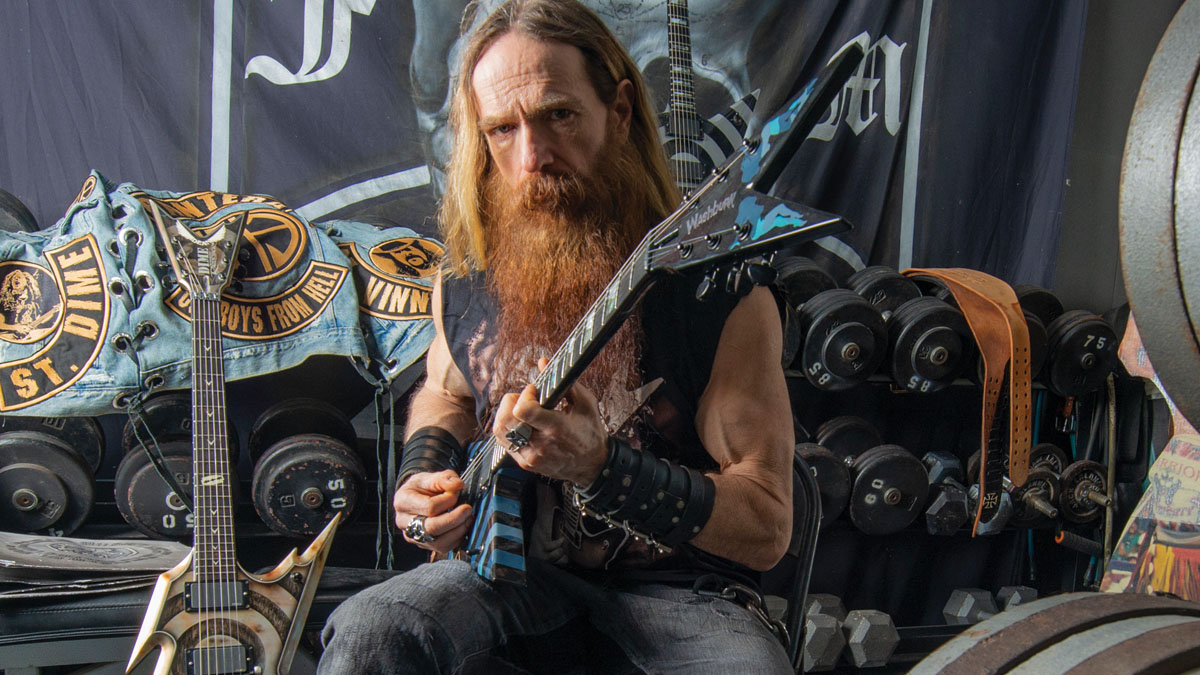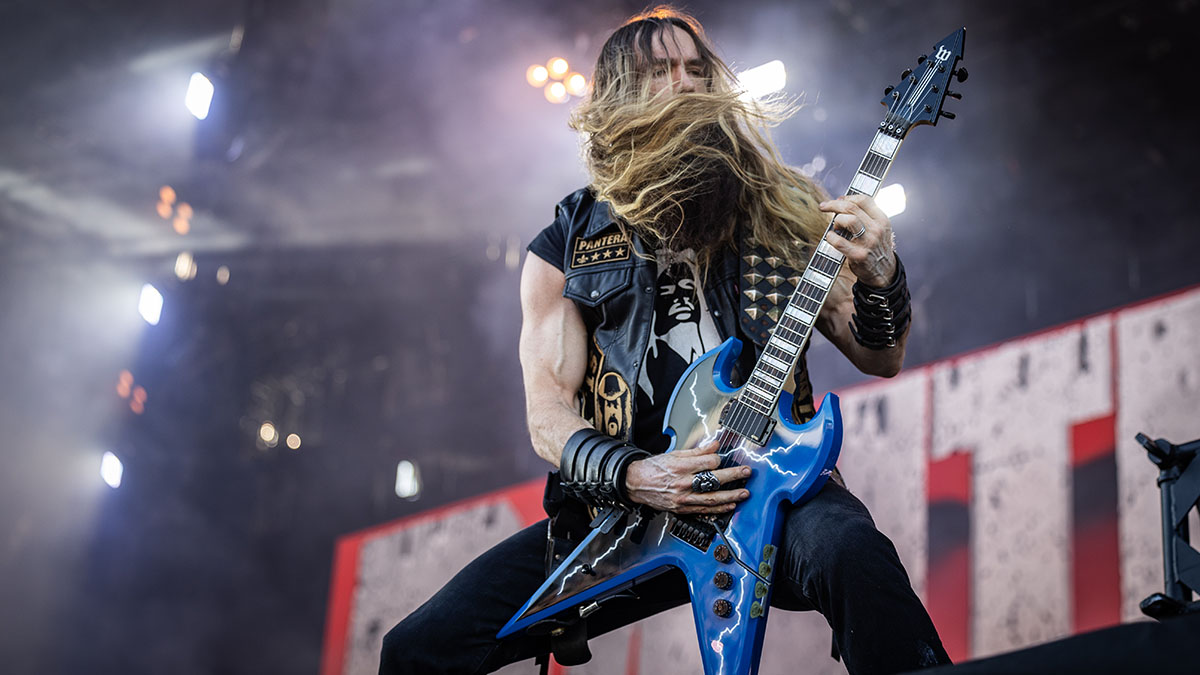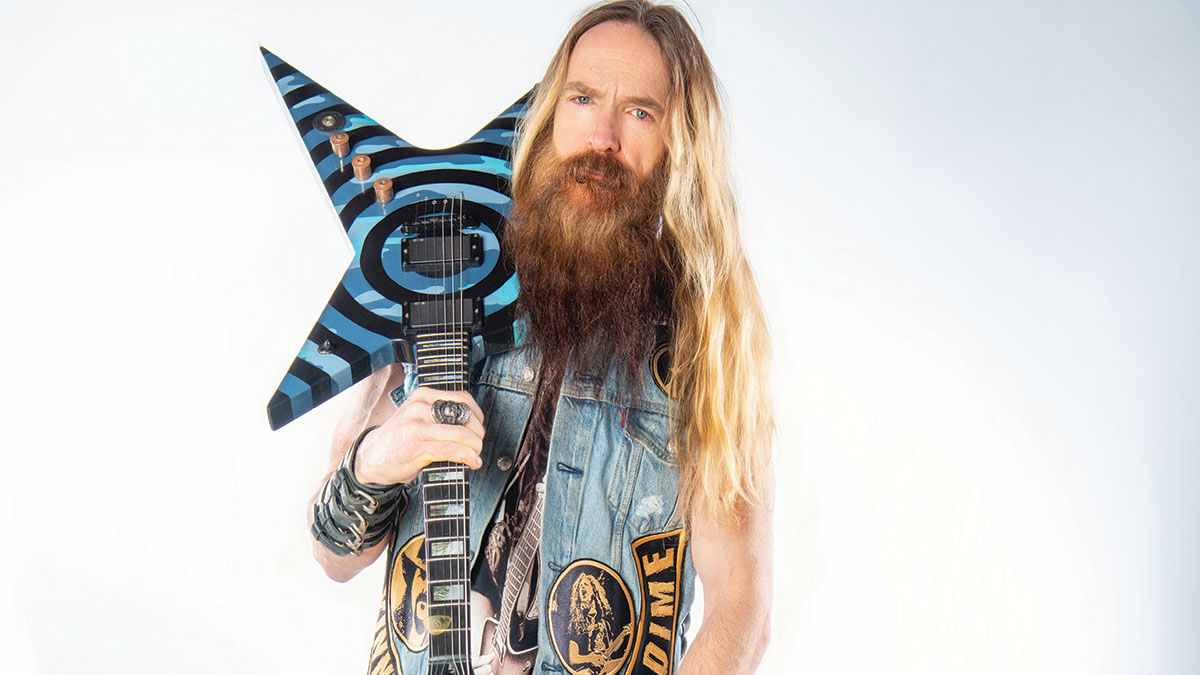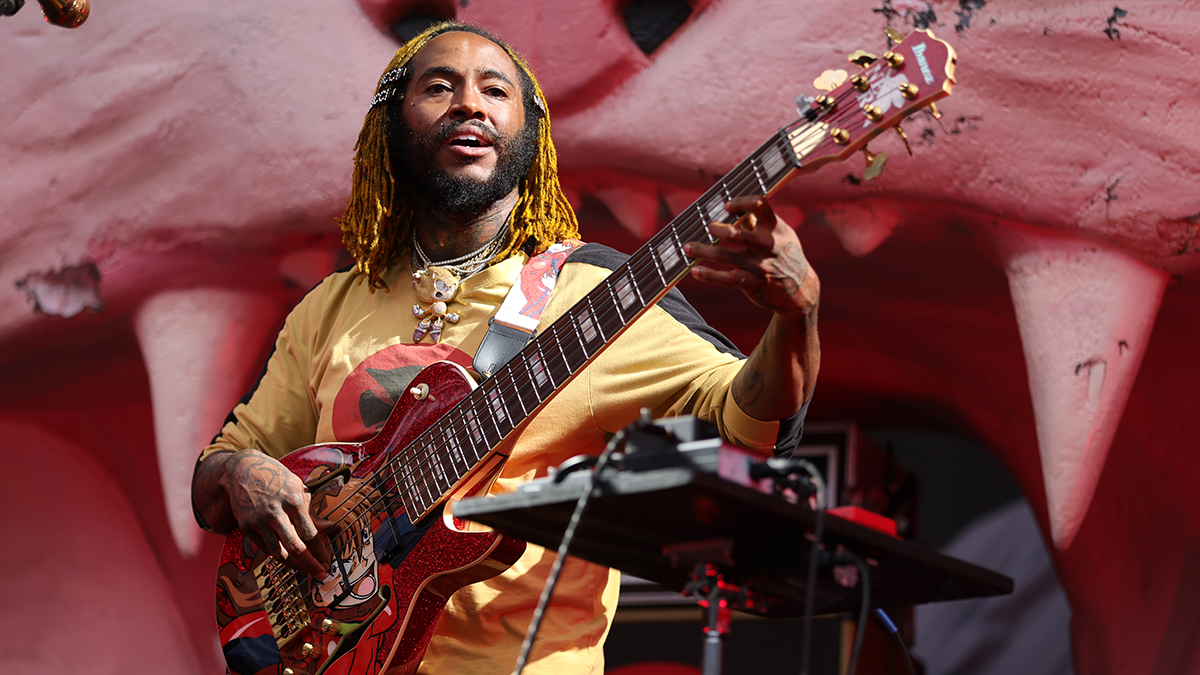Zakk Wylde: “It’s not just about Dime’s chops – it’s about what he created. That’s his legacy – and it’s way, way bigger than just being a great lead player”
Just how to do you replicate the hyper-aggression of Dimebag's guitar? Well, as Zakk Wylde explains, you need a noise gate, you need to let things rip, and you might need some magic, too

All the latest guitar news, interviews, lessons, reviews, deals and more, direct to your inbox!
You are now subscribed
Your newsletter sign-up was successful
The heartfelt words Wylde wrote in his popular Guitar World column, “Brewtality,” in early 2005 sum up his feelings for Darrell as a player and a person. “In my mind Dime was, without question, the best metal guitarist in the world – you’ve got Jimi Hendrix, you’ve got Eddie Van Halen, you’ve got Jimmy Page, you’ve got Randy Rhoads, you’ve got Tony Iommi, and you’ve got Dimebag Darrell. He belongs in those hallowed ranks without any shadow of a doubt.
“On top of his talent, though, Dime was also a beautiful guy. He was totally devoid of ego, as genuine as the day is long, and also the kindest person I’ve ever met. Every time he walked into a room; he’d light it up like the ray of sunshine he was. Dime was an angel that the good Lord sent down to brighten our lives and make us happy, but now he needs him, so he’s taken him back.
“I never had a brother, but Dime was as close to blood as possible, and my love for him was, is and always will be beyond unconditional and forever. The bottom line is this: Dime’s influence will be felt forever, and his memory will never, ever die. He lives on in every guitarist’s veins ’cause that’s what guitar playing is: one big brotherhood.”
And speaking of brotherhood, nearly 20 years later Zakk is now playing guitar on the Pantera tribute/celebration tour alongside Dime’s bandmates Philip Anselmo and Rex Brown with Anthrax’s Charlie Benante on drums. At every show, Wylde wears a denim vest featuring large “St. Dime” and “St. Vinnie” patches on its front.
Like I said, Zakk definitely wears his heart on his sleeve – or perhaps I should say, his chest.
One of the last times the two of us were together with Dime was for the “Booze Brothers” private guitar lesson that was part of Guitar World’s March 2003 issue. In it, you said hearing a great player inspired you “to wanna practice 24/7, and it still does to this day.” When you were learning Dime’s guitar parts for the Pantera shows, what aspects of his playing inspired you?
“Every single note, Father Nick – every single note! [Laughs] In addition to the hits like Walk, I’m Broken, Cowboys and This Love, we also do some deeper tracks like Yesterday Don’t Mean Shit [Reinventing the Steel], Strength Beyond Strength and Use My Third Arm [both from Far Beyond Driven]. While I was learning them, I realized a lot of the chord changes and note choices Dime would make were pretty dissonant – just for the flavor of the soup, if ya know what I mean.
All the latest guitar news, interviews, lessons, reviews, deals and more, direct to your inbox!
“I kept thinking, ‘Wow, that was interesting. I would’ve never made that chord change or gone to that note; I wonder why he chose to go there for this section.’ And obviously, some of Dime’s chord voicings are really interesting, too. He used a lot of root/major 3rd, root/minor 3rd and inverted chords instead of just playing a normal root/5th power chord. It’s definitely been a very cool experience.”
Dime also incorporated a lot of chromatic movement and blues bends, which, alongside the traits you’ve just mentioned, helped add extra tension, excitement and darkness to a riff or chord sequence.
“Without a doubt. There are definitely certain little bits of trickery and some Doug Henning [a famous Canadian magician who passed away in 2000] magical things going on in Dime’s stuff. Rex showed me a couple of things I wasn’t 100 percent sure about, like when Dime goes to G# in Becoming instead of a G, which is what a lot of people think he played, and I was like, ‘What sort of sorcery is this?!’ [Laughs]
“It’s all about adding Tabasco sauce or whatever type of flavoring you want – whether it’s cilantro or sour cream. It all depends on what you’re writing and what you’re aiming for. It’s like Tony Iommi putting the flat five in there because it makes a riff sound darker. Whereas Jimmy Page would sometimes use the major 3rd [hums the interlude riff of Bring It on Home from Led Zeppelin II], which is more of an uplifting thing. There is no right, and there is no wrong.”
How did you approach learning Dime’s riffs and solos?
“I learned Dime’s stuff the same exact way I do when I play with Ozzy, Zakk Sabbath, Generation Axe [with Steve Vai, Yngwie Malmsteen, Nuno Bettencourt and Tosin Abasi] or the Experience Hendrix stuff. You’ve just gotta sit down, do the work and learn how to play the song and solos – whether they’re by Saint Dime, Saint Randy, Lord Iommi or Saint Jimi, plus of course, Jake [E. Lee]. It’s no different. There’s a big difference between listening to and loving a song and actually being able to play it. You’ve just gotta put in the time and work – there’s no iPhone app for that, brother! [Laughs]”
I learned Dime’s stuff the same exact way I do when I play with Ozzy, Zakk Sabbath, Generation Axe or the Experience Hendrix stuff
Did you do it the “old school” way by listening to Pantera’s albums with guitar in hand, or did you use transcriptions and videos?
“I did all of the above, including watching YouTube and everything like that. I remember checking out some videos by Ola [Englund] just from Googling ‘how to play’ certain Pantera songs. Back in the day, you’d ask your friends if you couldn’t figure something out.
“Like I call you up and go, ‘Nick, you worked with Dime on his Guitar World column; what’s he doing on this section? I can’t make it out.’ But nowadays you can just go on YouTube and find some slamming player who’ll show you how to play Eddie’s tapping part in Eruption or whatever. So I definitely did a lot of that.”
I imagine the rehearsal boot camps were invaluable. Playing newly learned songs along with the recorded versions is one thing, but performing them in a band situation is a completely different beast, especially when they’re Pantera songs.
“Rehearsing those songs with the fellas is obviously really important; the training wheels are definitely off at that point! [Laughs] Like you said, playing along with the album is one thing, but being able to play those same exact songs by yourself or with other players is completely different. It’s like trying to drive someplace you’ve been before but without your car’s GPS. Good luck with that!
“For me, it’s a matter of retaining everything: learning all the parts and then remembering how many times they’re repeated before moving on to the next one. I deliberately write Black Label stuff as caveman as possible. But, as you and I know, a lot of Pantera’s material ain’t like that at all; it’s definitely not meat-and-potatoes-type stuff!
“Once again, you’ve gotta put the time and work in. There is no substitute for that, and there are no shortcuts. You can’t avoid it, Father Nick… you’ve just got to go to your room and do your homework like a good boy! [Laughs]”
And then, of course, there are those stellar solos.
“Dime’s solos are like prime steaks: ribeye, filet, porterhouse, sirloin, New York strip… They’re all different and they’re all great, so bring them all on! It’s kind of like the Ozzy thing, because for me they’re all fun to play. Obviously, I love doing Randy’s leads, but I also get to play the [Jake E. Lee] solo in Bark at the Moon, which is amazing, too. With Dime’s leads it’s the exact same thing.
“I mean, we start the set with A New Level, and Dime was just shredding through the whole solo – and that’s right out of the gate! Obviously, his solos in songs like Walk and This Love are Mr. Crowley-type leads where you have to play them the way it is on the record. They’re songs within songs, straight from the Saint Rhoads school of song and solo writing.”
As far as picking technique and stuff, I’m more staccato whereas Dime’s more legato. That’s just the way I play
To quote Dime from “The Booze Brothers” private lesson you guys did together in the March 2003 GW, “When it comes to leads, Zakk plays a pretty hardcore right-hand game. He picks a hell of a lot more than I do, whereas I tend to slur a lot more than he does. Both approaches are equally cool, though; they just have a different attack and feel.” Did you find that learning his solos made you change your usual picking approach in certain places?
“As far as picking technique and stuff, I’m more staccato whereas Dime’s more legato. That’s just the way I play. That said, there are certain parts where it has to be legato, so you just do it, otherwise you’re not going to get that sound. If Saint [Allan] Holdsworth wanted to pick every note, he could have, but it wouldn’t have given him the flavor of soup he was looking for. He wanted it to sound breathy, like a saxophone, not staccato.”
Due to your unique playing style and approach, at the end of the day, you’re always going to sound like you and, in my humble opinion, that’s a wonderful thing.
“Without a doubt, and that’s the beauty of the guitar. Stevie Ray Vaughan playing Voodoo Child sounds like Stevie Ray Vaughan playing Voodoo Child – he has such a unique touch, sound and style, he just can’t help it! It’s the same thing as hearing Randy playing Black Sabbath stuff – it sounds like him and it’s awesome.”
I spoke with Ola [Englund] and Grady [Champion, Dime’s guitar tech] and, like me, they both feel Darrell would’ve loved the fact that you’re honoring him by playing his songs and solos “the Zakk way.” And, just like you playing his material with Phil, Rex and Charlie, I’m sure Dime would be totally reverent to what you recorded but play it in his own unique, inimitable style.
“Yeah, without a doubt. All the notes in the No More Tears solo would be right, but it would still sound like Dime playing because it would have his touch – you couldn’t escape that, and you wouldn’t want to. That’s the beauty of it; it would be his interpretation of the parts he learned.”
I noticed that in all the footage and photos I’ve seen of the first six South American shows, it looked like you were only using one guitar: a Wylde Audio Warhammer tuned down to C# and armed with a Floyd Rose plus your usual EMG 81/85 pickups.
“I just used one guitar through the whole show for that first run. That was it – plug in and off we go!”

I know Dime gave you some guitars; can we expect to see any of those making an appearance at any of the upcoming shows?
“I definitely want to bring them out, but I didn’t want to travel with them on a lot of flights like we were doing in South America. I was like, ‘Man, if these things disappear, I’ll be pretty bummed out.’ The guitars Dime gave me are literally ‘one of one.’ There are no replicas, and even if there were, the whole special part of it would be me bringing the real thing out on stage.”
Those gates definitely do their job, and that ‘silence’ is such a huge part of the Dimebag soup. I mean, with Dime there was never enough distortion!
From what I can gather, the rig you’ve been using thus far mainly consists of the usual amps, cabs and pedals you normally use.
“That’s right, I’m using the rig I use with Black Label, Ozzy, Zakk Sabbath, Experience Hendrix and Generation Axe – my Wylde Audio tops, my Marshall cabinets and my usual pedalboard. Because Dime used solid-state amps in Pantera and I use tube stuff, I wasn’t sure if it would sound right.
“So when I was getting ready to rehearse with the fellas, I was thinking of finding out what Randall heads Dime used and then buying a whole bunch of them on Reverb or eBay. But when we got down to rehearsals, I used my rig and it worked out just fine. Obviously, I had to get a [DigiTech] Whammy pedal for Becoming, so I’m now the proud owner of one of those.
“And I had to get noise gates too because I don’t use them. I just Googled ‘best noise gates’ and the Dunlop one [Dunlop MXR Smart Gate Noise Gate M135] came up so I bought a couple. Those pedals are amazing; I can stand right in front of my rig with it screaming pure lightning and it doesn’t feed back when I’m playing stuff like 5 Minutes Alone, Walk or the verse riff in Cowboys. There’s nothing, just silence.
“Those gates definitely do their job, and that ‘silence’ is such a huge part of the Dimebag soup. I mean, with Dime there was never enough distortion! [Laughs] He just wanted his tone as massively distorted as possible without having to turn down; that was a big part of Dime’s sound.”
Do you dial in your amps differently for the Pantera shows?
“No. It’s just balls to the wall. Thank the good Lord and John Paul II for those noise gates, though. Without those bad boys I wouldn’t be able to get through the Pantera show; I’d be tap dancing on my pedalboard like I was in Riverdance, switching my OD pedal on and off all the time! [Laughs]”
You pretty much leave your overdrive pedal switched on the whole time, right? It’s an integral part of your sound.
“It’s always on except for in This Love and Planet Caravan, where I just turn the pedal off, turn the volume on my guitar down and there’s my clean sound. I don’t channel-switch or anything like that – I never have. I just use stompboxes right into single-channel heads. There’s fewer things that can go wrong with a simple setup like mine.”
The music business isn’t what it used to be, so now I’m doing a part-time gig at Chippendales! I’ve been giving Barb lap dances as well
In addition to your long-serving guitar tech, Stephen Murillo, you’ve also got Dime’s wingman, Grady Champion, working with you on the Pantera shows.
“Yeah, Grady’s part of the show. He’s back there in the kitchen cooking things up, getting things ready, operating the Whammy pedal, tweaking the gates and stuff like that – just like he did with Dime.”
A lot of people have been commenting on how your arms have been looking impressively chiseled of late. I’m asking for a friend – what’s the story there?
“The music business isn’t what it used to be, so now I’m doing a part-time gig at Chippendales! I’ve been giving Barb lap dances as well, so I’m making money on the side doing that. A man’s gotta do what a man’s gotta do!”
With several shows already under your belt and many more to come, what are your thoughts and takeaways from the Pantera experience so far?
“I always knew Dime was great, but now [that] I’ve really studied a bunch of his songs and solos, he’s even greater-er-er than I even realized. He definitely sits at the table with his heroes and breathes the same rarified air as Tony Iommi because, just like Black Sabbath, Pantera created a genre of music; they were the precision machine that’s still considered its benchmark to this day.
“It’s not just about Dime’s chops and how great his technique was; it’s about what he created. That’s his legacy – and it’s way, way bigger than just being a great lead player.
“Also, Pantera’s music is so powerful and special; it’s perfectly designed for live shows and festivals – it really is. The crowd reactions have been just insane. Dime and Vinnie would definitely be loving it – seeing what they were a part of and what they created.

“As you and I know, every day with Dime and Vinnie was Friday or Saturday night. They enjoyed life to the fullest. So, I always tell everybody this: if you want to celebrate Dime and Vinnie, you should be thankful every single day and kick as much ass as you possibly can!
“I enjoyed many Dimebag debacles that got me in the doghouse with the wife! [Laughs] And then I’d always have to send him in to talk with her to smooth things out – ’cause I knew she wasn’t going to yell at Dime ’cause he was such a charming sweetheart of a guy!
“At the end of the day, I’m far beyond honored that I got asked to help to celebrate the incredible greatness of Saint Dime and Saint Vinnie. I guess you could say I’m on a mission from God, just like Jake and Elwood! [Laughs]
“Joking aside, we’re just four friends celebrating our buddies’ memory and the amazing thing they created that brings so many people joy and happiness – just like their heroes did. That’s why we still listen to Randy, Eddie, Sabbath, Zeppelin, Jimi Hendrix and Pantera – because it brings you to your happy place. It’s a beautiful thing and to me, every show we’ve done in honor of Dime and Vinnie has been beyond special. Far beyond…”
